Ever wondered why some Border Collies are bursting with energy while others seem tired? It often comes down to their diet. Good nutrition for Border Collies is more than just filling a bowl. It’s about knowing their special needs for their active and smart nature.
In this guide, you’ll discover the best foods for Border Collies. You’ll learn about the importance of high-quality protein and essential nutrients. These tips can greatly improve your pet’s health and happiness, whether you’re new to owning a Border Collie or looking to enhance their diet.
Key Takeaways
- Border Collies need high-quality food with more protein and omega-3 fatty acids.
- Feeding schedules change from puppies to adults, affecting their health.
- It’s important to understand ingredient labels to choose the right food.
- Regular exercise and proper nutrition help prevent obesity.
- Homemade diets should focus on safe ingredients and balanced nutrients.
Understanding the Nutritional Needs of Border Collies
Border Collies are full of energy and need the right mix of nutrients. A balanced diet is key for their health and happiness. It should include proteins, healthy fats, vitamins, and minerals.
They need 20% to 24% protein, especially if they’re very active. This amount changes based on their age, weight, and health. It’s important to watch their food intake to avoid weight problems or stomach issues.
Healthy fats are also crucial for their energy and skin health. Vitamins A, D, E, and B-complex, along with minerals like calcium and phosphorus, make their diet complete. Always have fresh water available for them to stay hydrated and digest food well.
As Border Collies get older, their dietary needs change. Puppies need certain nutrients for growth, while older dogs need food that supports their joints and energy. Offering different types of food can meet their unique needs and tastes.
| Nutritional Component | Recommended Range | Benefits |
|---|---|---|
| Protein | 20% – 24% | Supports muscle mass and energy levels |
| Fats | 5% – 15% | Healthy skin and coat, energy source |
| Vitamins & Minerals | Varied | Overall health, immune support, joint protection |
| Fiber | ~4% | Aids digestion and prevents obesity |
Adjusting their diet based on their activity and health ensures they stay balanced. This way, they can live a happy and healthy life.
Choosing the Best Food for Border Collies
Choosing the right food for Border Collies means knowing what they need. They need lots of high-quality protein to stay active. It’s important to pick foods that are natural and not too processed.
This way, your dog gets the nutrients they need to stay healthy and full of energy.
High-Quality Protein Sources
Border Collies love foods high in protein like lean meats, fish, and eggs. These foods help keep their muscles strong and their health good. A diet rich in protein keeps them full of energy and ready to play.
Some owners also find that a raw diet helps with allergies. It’s a more natural choice that’s closer to what their ancestors ate.
Best Food Options: Raw vs. Kibble
There’s a big debate about whether to feed raw or kibble. Raw diets are made of unprocessed meats and veggies, just like what dogs used to eat. Many owners say it makes their dogs’ digestion better and their coats shinier.
Kibble, on the other hand, is easy to serve and is made to meet Border Collies’ nutritional needs. It has the right mix of ingredients.
| Aspect | Raw Dog Food | Kibble |
|---|---|---|
| Protein Quality | High-quality, unprocessed | Varies, but often includes fillers |
| Digestibility | Excellent for most dogs | Good, but may vary |
| Convenience | Requires preparation | Ready to serve |
| Allergic Reactions | May reduce occurrences | Potential triggers from additives |
Border Collie Nutrition and Feeding
Feeding your Border Collie right is key. They need the right nutrient requirements for border collies. A good border collie feeding schedule keeps them healthy and full of energy. They should get 18% to 20% protein.
Active dogs might need up to 22% protein. For days of agility or flyball, 24% protein helps meet their energy needs.
Many choose complete dried foods for their dogs. These foods come in various formulas for different life stages. Some mix different foods for a balanced diet. Groups like Border Collie Rescue add fresh or cooked ingredients to make meals more nutritious.
Feeding twice a day is common. But, pregnant dogs, puppies, and seniors might need more. A working Border Collie’s diet should have 20% protein, 10% fats, and the right vitamins and minerals.
Water is crucial for dogs. Always have fresh water ready, especially with dried food. Brands like Iams, Purina, and Diamond offer good options for Border Collies.
| Diet Type | Protein Level | Recommended for |
|---|---|---|
| Average Companion | 18%-20% | Low to Moderate Activity |
| Active Border Collies | 22% | Regular Exercise |
| High Energy Output | Up to 24% | Agility/Flyball Competitors |
| Working Dogs | 20% Protein, 10% Fats | High Activity |
Feeding Schedules for Border Collies
Setting up a good feeding schedule for border collies is key for their health and growth. Puppies need to eat about four times a day until they are six months old. After that, they should eat three times a day, with the right amount based on their age, weight, and how active they are.
When they turn 13 months, it’s time to switch to adult food. This means they’ll eat twice a day. Having a regular feeding schedule helps keep your pet’s routine steady.
Feeding Frequency Recommendations
For border collies, how often they eat is very important for their diet. Here are some general guidelines:
- Puppies (up to 6 months): 4 meals daily
- Puppies (6 to 12 months): 3 meals daily
- Adults (13 months and older): 2 meals daily
The amount of food puppies need changes a lot, depending on their weight and age. It can range from 153g to 361g. Adult dogs usually need 148g to 361g each day. It’s important to adjust how much food they get to keep them at a healthy weight and energy level.
Portion Control for Optimal Weight Management
Portion control for dogs is very important to avoid obesity, especially in high-energy breeds like border collies. It’s important to measure their food to make sure they get the right amount of nutrients. Adult border collies should get about three-quarters of a cup of high-quality dry food twice a day.
Don’t forget about treats, as they can add a lot of calories and cause weight gain. Consider your dog’s activity level, weight, and if they’re spayed or neutered when figuring out how much food they need.
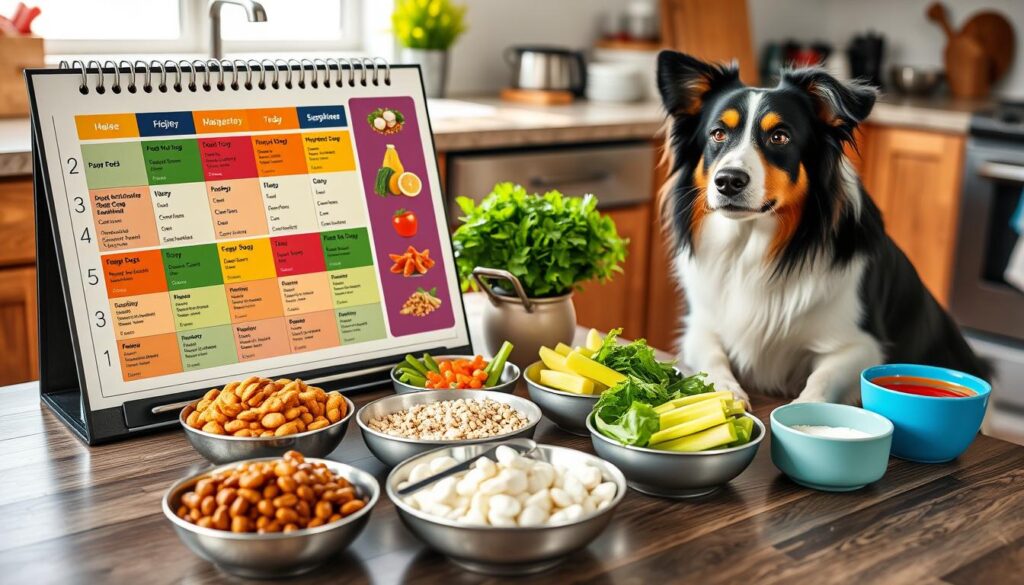
Caloric Requirements for Active Border Collies
Active Border Collies need a certain amount of calories to stay healthy and full of energy. An adult Border Collie should get between 1,000 to 1,400 calories every day. Puppies need less, about 800 to 1,000 calories daily, and should eat three or four times a day to support their growth. Senior dogs usually need around 700 to 900 calories each day.
Feeding them the right food is key to their health. The right amount helps with border collie weight management. This is important to avoid too much weight, which can harm their health. Watching their weight and food intake helps keep them in top shape.
| Life Stage | Caloric Needs (Daily) | Recommended Dry Food (Cups) |
|---|---|---|
| Active Adult | 1,000 – 1,400 calories | 3 – 4 cups |
| Puppy | 800 – 1,000 calories | 1/2 – 1 cup (twice daily) |
| Senior | 700 – 900 calories | 2 – 3 cups |
For example, if your Border Collie eats dry food with 350 calories per cup, you need to figure out how much they should eat. Their activity level, like two hours of exercise daily, affects their calorie needs. Using recipes from PawCo that are low in fat, rich in antioxidants, and control energy helps keep your dog healthy and active.
Balanced Diet Tips for Border Collies
It’s key to give border collies balanced meals for their health. They need the right mix of protein and fat to stay energetic. These tips can make your dog’s life better.
Protein and Fat Ratios
Border collies should eat 20% to 25% protein and varying amounts of fat. Foods like poultry, beef, and fish are great for muscles and energy. Look for dog foods with enough protein and fat, like:
| Dog Food Brand | Minimum Protein Content | Minimum Fat Content |
|---|---|---|
| The Farmer’s Dog | 41% | 31% |
| Orijen Original Grain-Free | 38% | 18% |
| American Journey Active Life | 25% | 15% |
| Crave High-Protein Chicken | 34% | 17% |
These foods focus on protein and fat, fitting for border collies. They help meet their energy and health needs.
Incorporating Vegetables and Fruits
Adding fruits and veggies to their diet is good. Safe options like carrots, spinach, and apples add vitamins and minerals. They make meals tasty and boost health, like digestion and immunity. Just remember to avoid toxic foods like grapes or onions.
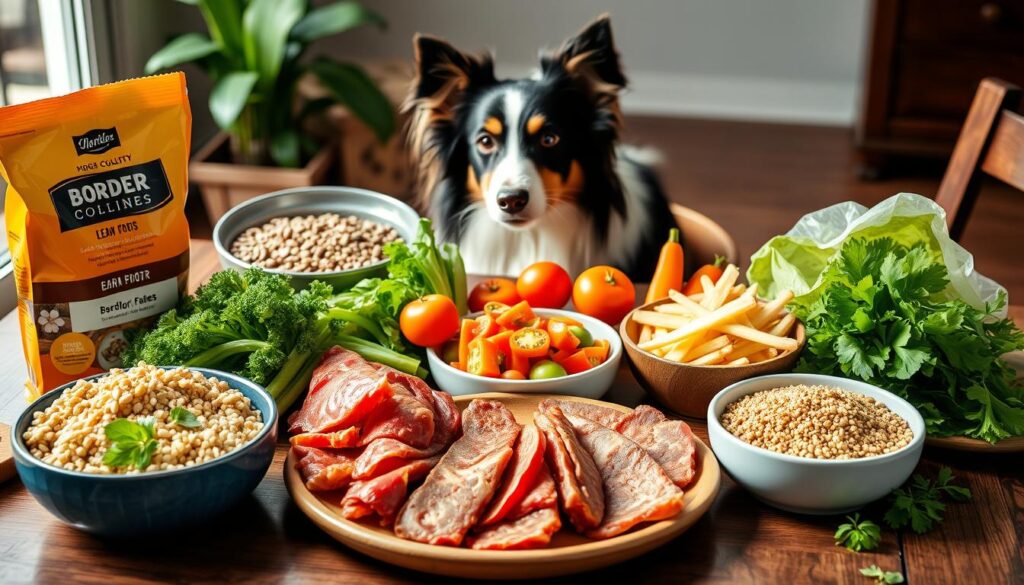
By balancing protein and fat and adding veggies and fruits, you give your border collie healthy meals. These meals support their health and long life.
Homemade Recipes for Border Collies
Making your own dog food can be rewarding for you and your Border Collie. It lets you control what they eat. Make sure to include proteins, carbs, and fats for a balanced diet.
Guidelines for Preparing Dog Food at Home
Here are some tips for making dog food at home:
- Choose high-quality proteins like mince turkey or beef.
- Add carbs like brown rice or oats for energy.
- Vegetables are good for vitamins and minerals.
- Stay away from onions and garlic.
- Always check with a vet to make sure it’s balanced.
Safe Ingredients for Homemade Meals
Choosing the right ingredients is key. Here are some recipes to start with:
| Recipe | Ingredients | Quantity |
|---|---|---|
| Turkey Delight | Minced Turkey | ½ kg |
| Brown Rice | 2 cups | |
| Water | 6 cups | |
| Dried Rosemary | 1 tsp | |
| Mixed Vegetables | ½ packet | |
| Doggie Muffins | Brown Rice | 1 ½ cups |
| Minced Beef (or Chicken/Turkey) | 3 kg | |
| Grated Potatoes | 4 big | |
| Grated Carrots | 4 big | |
| Chopped Celery Sticks | 4 big | |
| Rolled Oats | 1 ½ cups | |
| Water | 3 cups | |
| Eggs | 8 | |
| Pinch of Salt | N/A | |
| Olive Oil | ¼ cup | |
| Dog Biscuits | Cornmeal | 1 cup |
| Wholemeal Flour | 2 cups | |
| Salt | 1 tbsp | |
| Vegetable Oil | 1/3 cup | |
| Egg | 1 | |
| Chicken Stock | 1 cup |
These homemade recipes are great for your Border Collie. They’re full of safe ingredients. Your dog will thank you, and you’ll know you’re feeding them well.
Healthy Treats for Border Collies
Choosing the right treats for your Border Collie can make training more successful. Look for treats that are low in calories but full of nutrients. This helps keep your dog healthy without adding extra weight.
Opt for treats made from natural ingredients. This can help avoid problems like upset stomachs and allergies that come from processed foods.
Best Treat Options for Training Rewards
Healthy treats are great for motivating your dog during training. Dried liver is a top choice because it’s easy to break into small pieces. Other good options include:
- Dried kangaroo
- Dried beef
- Dried turkey
- Dried chicken
- Dried pork
Using different rewards, like praise or playtime, can help reduce the need for treats. This keeps your Border Collie interested and motivated during training.
Considerations for Treat Types
When picking treats, choose high-quality ones without artificial additives. Homemade frozen treats are a healthy, low-fat choice for hot weather. They’re made with water, stock cubes, and chicken or beef.
Also, consider baking healthy treats at home. Parsley biscuits are a good example. They can be frozen for later use.
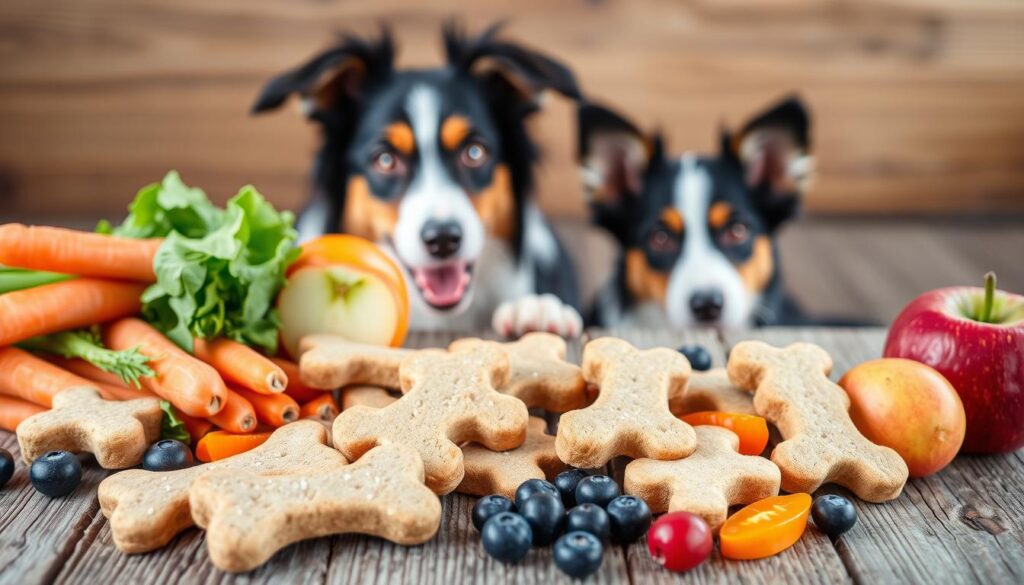
| Treat Type | Main Ingredients | Benefits |
|---|---|---|
| Dried Liver | Liver | Highly palatable, low-calorie, ideal for training |
| Frozen Chicken Treats | Water, stock, chicken | Hydrating, nutritious, low-fat |
| Parsley Biscuits | Yeast, parsley, wholemeal flour | Nutritious, can be frozen, great for dental health |
| Beef Rib | Beef | Rich in flavor, satisfies chewing needs |
Picking the right treats is key to your Border Collie’s health. Choosing natural, wholesome options makes training rewarding for both you and your dog.
Supplements for Border Collies
Border Collies are very active and can really benefit from special supplements. These supplements give them the nutrients they need to stay healthy and move well. This helps your dog live a happy and active life.
Joint Health Supplements
Keeping your dog’s joints healthy is very important, especially for Border Collies. Giving them supplements with glucosamine, chondroitin, and turmeric can help a lot. These ingredients help keep the cartilage healthy and can prevent arthritis.
It’s a good idea to start giving these supplements when your dog is about five years old. This helps prevent joint problems as they get older. Always watch how your dog reacts to the supplements. If they seem off, stop using them and talk to your vet right away.
Always follow your vet’s advice when choosing supplements. This makes sure your dog gets the right amount of nutrients without getting too much.
Nutritional Enhancements for Active Dogs
Adding special nutrients to your dog’s diet can really boost their energy. Omega fatty acids, especially from green-lipped mussels, are great for their skin and brain. Adding fruits and veggies rich in antioxidants can also help lower cancer risks.
Look for high-quality supplements that have been tested for safety and work well. Keeping a regular routine with supplements is key to seeing the best results. For example, Purina’s FortiFlora is good for puppies and older dogs, especially when they’re feeling sick.
| Supplement Type | Main Ingredients | Benefits |
|---|---|---|
| Joint Health | Glucosamine, Chondroitin, Turmeric | Supports mobility, reduces stiffness |
| Omega Fatty Acids | Green-Lipped Mussels | Promotes skin health and cognitive function |
| Probiotics | Purina’s FortiFlora | Aids digestion, helps with upset stomach |
Identifying Border Collie Dietary Requirements
It’s key to know what Border Collies need to eat for their health and performance. Their diet can change based on if they work or just hang out at home. Knowing the border collie dietary needs helps each dog do well, based on their life.
Special Considerations for Working Dogs
Working Border Collies need food that fuels their busy lives. They do lots of herding and hard work, so they need more protein and calories. A good diet for them should have:
- High-quality protein for muscle health
- More calories to keep up with their energy use
- Healthy fats for energy and shiny coats
Adding omega-3 and omega-6 fatty acids is also important. It keeps them healthy and helps their joints.
Dietary Needs for Companion Dogs
Companion Border Collies are more laid-back. They need less calories to avoid getting too fat, but still need a balanced diet. Important things for them include:
- A mix of protein, fats, and carbs to keep a good weight
- Vitamins and minerals for a strong immune system
- Watching portion sizes to avoid getting too heavy
Adjusting their diet based on their activity helps them stay healthy as they age. It also helps with problems like hip dysplasia and eye issues. Making sure they drink plenty of water is also crucial for both types of dogs.
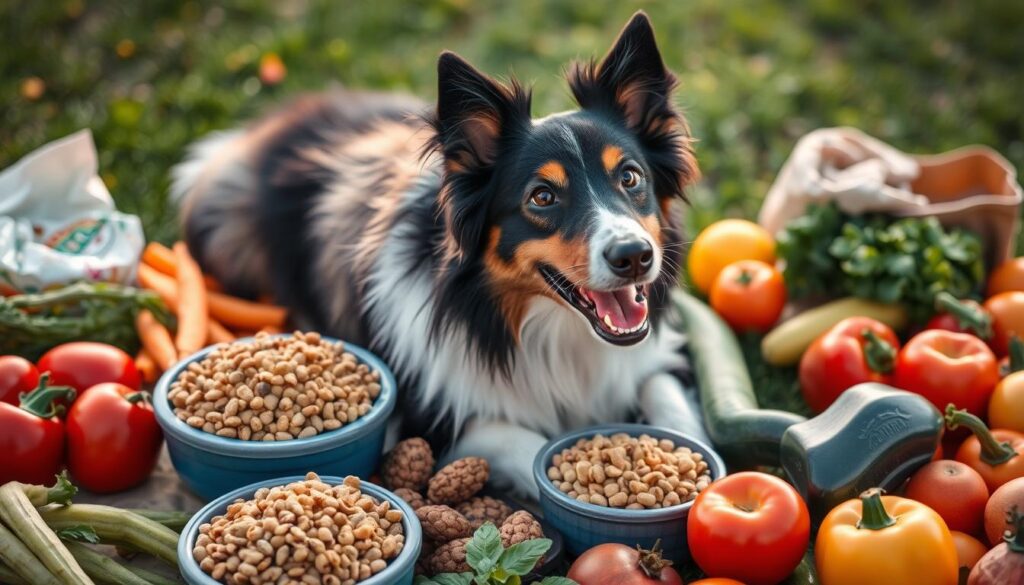
| Aspect | Working Dogs | Companion Dogs |
|---|---|---|
| Protein Needs | Higher protein for muscle maintenance | Moderate protein for overall health |
| Caloric Intake | Increased calories for energy | Controlled calories to prevent obesity |
| Activity Level | High; requires nutrient-rich foods | Lower; requires balanced nutrition |
| Fats | Healthy fats for energy | Lower fat content as needed |
Managing Weight in Border Collies
Keeping your Border Collie at the right weight is key. They are full of energy and can easily get overweight. About 25% of them are overweight, so watching their diet and exercise is important.
Regular walks and watching what they eat help prevent obesity. This is crucial for their health.
Preventing Obesity in High-Energy Breeds
To stop obesity in Border Collies, feed them right and keep them active. They need at least two hours of hard exercise every day. Eating less carbs and more protein helps them stay lean.
Knowing when they’re gaining weight is also important. Look for a visible waist and feel their ribs. This helps you act fast.
Monitoring Eating Habits and Portion Adjustments
Watching your dog’s eating habits is a big part of managing their weight. A regular feeding schedule helps their metabolism and stops hunger. Be careful with treats; choose low-calorie ones.
Regular vet visits are also key. They help check your dog’s weight and adjust their diet and exercise. This keeps your Border Collie healthy and happy for a long time.
Quality of Ingredients in Dog Food
The ingredients in your dog’s food are key to their health. When picking food for your Border Collie, learn about the labels. This helps ensure a diet rich in nutrients and free from harmful stuff.
Understanding Ingredient Labels
Ingredient labels show a food’s nutritional value. Look for clear, high-quality ingredients at the top. Whole foods are better than vague terms like “meat by-products” or “meal.” Here’s what to focus on:
- High-quality protein sources like chicken or beef should be listed first.
- Avoid foods with excessive fillers such as corn, soy, or wheat.
- Ensure that the food includes wholesome fats for energy and skin health.
- Check for any artificial additives that could harm your dog.
Avoiding Harmful Additives
To keep your Border Collie healthy, avoid harmful dog food additives. Many commercial foods have preservatives, colors, and artificial flavors that can be risky. These can lead to long-term health problems. Here’s how to avoid these risks:
- Choose brands that disclose all their ingredients transparently.
- Seek out options labeled as “natural” or “organic” to reduce exposure to harmful substances.
- Look for dog foods that add beneficial supplements like vitamins and probiotics without unnecessary fillers.
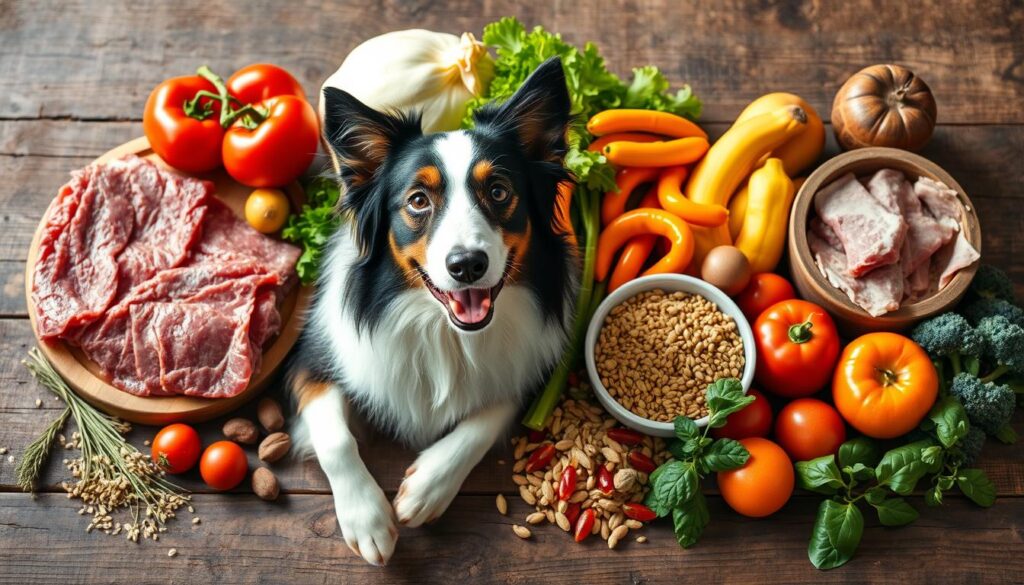
Preparing for Transitioning Dog Foods
Changing a dog’s food can be tricky, especially for a Border Collie. Start by adding the new food slowly over 7 to 10 days. This helps your dog get used to the new taste without upset stomachs.
Watch for any signs of intolerance or allergies. If you notice any, you might need to make some changes.
Choosing the right food is key for a smooth transition. Border Collies need lots of energy, so pick high-quality, nutritious foods. Look for brands like Scratch, which offer low-GI energy sources and premium proteins.
Scratch’s recipes are made by nutritionists to meet Border Collies’ needs. They include healthy fats and essential nutrients.
If health issues come up, talk to a vet. The aim is to keep your dog healthy and happy. A smooth transition can boost your Border Collie’s health and energy.
Considerations for Grain-Free Diets for Border Collies
Grain-free diets for border collies are becoming more popular. They are especially good for dogs with food sensitivities. Your border collie might do well on grain-free food. But, make sure these diets don’t have too many carbs from other sources.
When thinking about grain-free food for your dog, watch how they react. Grain-free diets can help with digestion and skin health. Look at your dog’s energy, coat, and stool to see if it’s working.
Always talk to your vet before changing your dog’s diet. They can help make sure your dog gets everything they need. With the right care, grain-free diets can be great for active border collies.
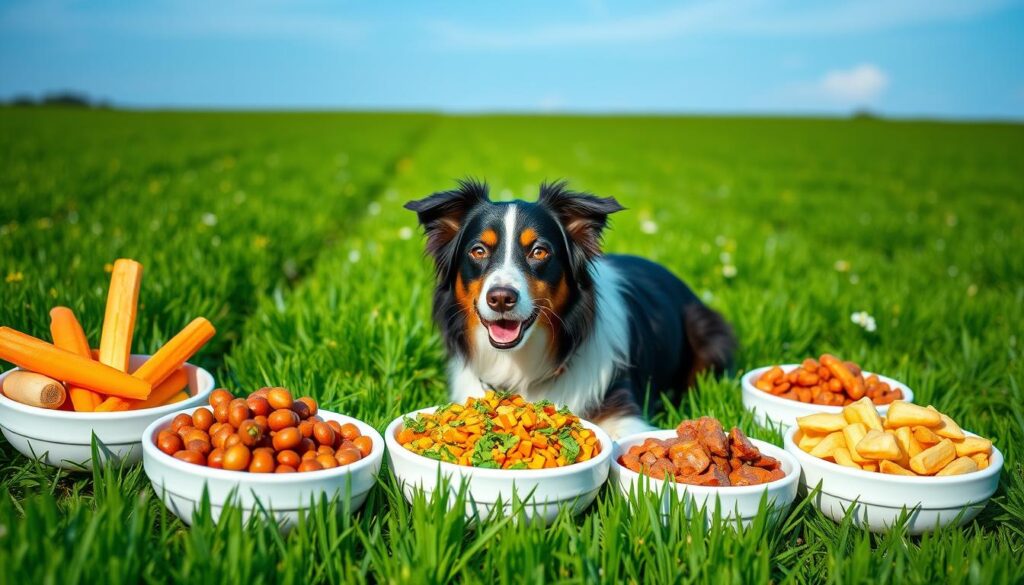
Border Collie Meal Planning Suggestions
Creating a good border collie meal planning plan is key to your dog’s health. It makes sure they get the right nutrients for their needs. A good meal plan for border collies includes quality proteins, veggies, and vitamins.
Knowing how active your dog is helps with portion sizes. This helps keep them at a healthy weight.
Stick to a feeding schedule for dogs to help them eat well. Adult Border Collies do best with one meal a day. Puppies need two meals a day until they’re six months old. This plan has many benefits:
- It helps them get the right nutrients.
- It helps with weight control.
- It can prevent picky eating.
- It makes them feel better overall.
Here’s a table with some good food types and what they offer:
| Food Type | Protein Content | Carbohydrates | Suggestions for Use |
|---|---|---|---|
| Chicken | High | Low to Medium | Use as a primary protein source |
| Beef | High | Low | Mix with vegetables for balanced meals |
| Fish | Moderate | Low | Incorporate for healthy fats |
| Vegetables | Varies | Low | Choose leafy greens for nutritious snacks |
Having many healthy foods in your border collie meal planning helps your dog get all the nutrients they need. A good diet changes as your dog grows. A well-thought-out diet makes your Border Collie healthier and happier.
Training and Nutrition Link in Border Collies
The bond between training and nutrition in Border Collies is strong. This breed is known for its agility and smarts. They do best with the right food for their busy lives. Good meals help them stay sharp and full of energy during training.
To get the most out of training, keep these tips in mind:
- Quality Ingredients: Choose dog food high in protein and nutrients to meet their energy needs.
- Consistent Feeding Schedule: A regular meal time helps your dog stay focused on learning.
- Hydration: Make sure your dog always has fresh water. It’s key for their brain and performance.
Border Collies need lots of training and mental challenges to stay interested. Good nutrition helps them focus and learn better. This shows how important diet is for their training.
| Nutrition Component | Effect on Training Performance |
|---|---|
| High-Quality Protein | Increases energy and muscle recovery, essential for active training. |
| Carbohydrates | Provides sustained energy during lengthy training sessions. |
| Vitamins & Minerals | Supports cognitive function and overall health, leading to better learning. |
| Healthy Fats | Boosts endurance and enhances focus, vital for intense training. |
Knowing how diet affects training is crucial for dog owners. A balanced diet helps your Border Collie do well in training. It also makes their life happy and healthy.
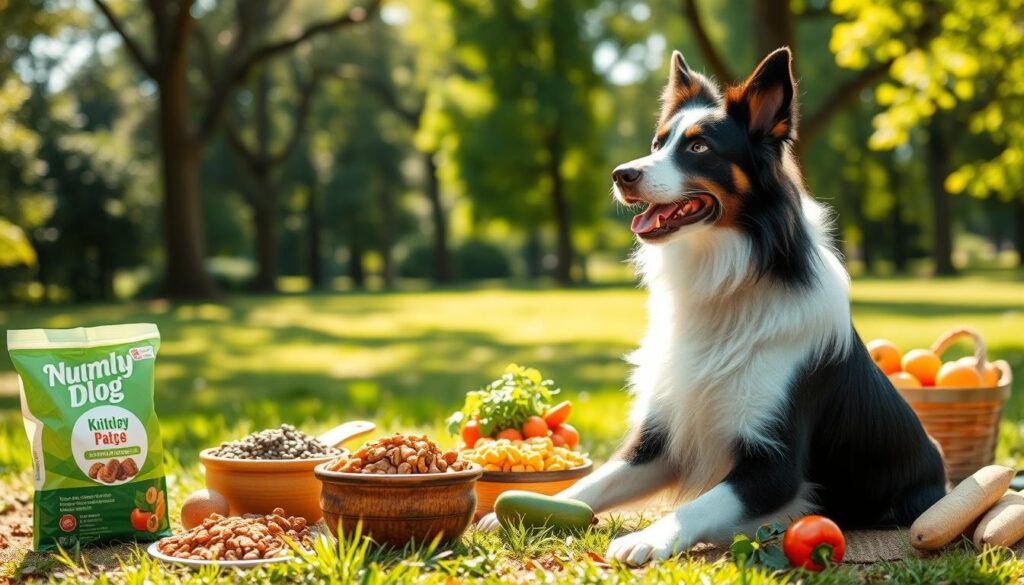
Factors to Consider When Choosing Dog Food for Border Collies
Choosing the right dog food for border collies involves several important factors. The quality of protein is key. Look for sources like chicken, beef, and fish. These provide essential amino acids for muscle maintenance and health.
It’s also crucial to consider where the ingredients come from. Opt for brands that use natural, high-quality ingredients. Stay away from foods with artificial flavors, colors, or preservatives.
Nutritional balance is another key factor. Border collies have specific needs based on their life stage and activity level. Puppies need more protein for growth, while adult dogs need fats for energy. Adult dogs should have 18% to 30% protein in their food.
Activity level also plays a big role. Active dogs need more calories, while senior dogs may need adjusted protein and fat levels. These factors directly affect your dog’s health and lifestyle.
Here’s a table to help you understand dietary needs at different life stages:
| Life Stage | Protein (%) | Fat (%) | Fiber (%) | Calories (Daily) |
|---|---|---|---|---|
| Puppy | High (25-30) | Moderate (10-15) | Up to 4 | Up to 1,400 |
| Adult | Optimal (18-30) | Moderate (5-20) | Around 4 | Approx. 1,000 |
| Senior | Moderate (20) | Low (10) | No more than 2 | Varies |
Understanding these factors helps you make better choices for your border collie. This ensures they stay healthy and thrive at every stage of life.
Conclusion
Ensuring your Border Collie gets the right nutrition is key to their health and happiness. Choosing high-quality food is vital for their energy and long life. A balanced diet and regular feeding times help a lot.
It’s important to know that good nutrition is more than just meals. It’s about meeting their needs, especially when they shed or change how active they are. Following the tips for feeding your Border Collie can help them live a happy life. It can prevent problems like being too heavy or feeling anxious.
Your commitment to good nutrition will help your Border Collie live a full and energetic life. They could live up to 12 to 15 years, full of life and happiness.



